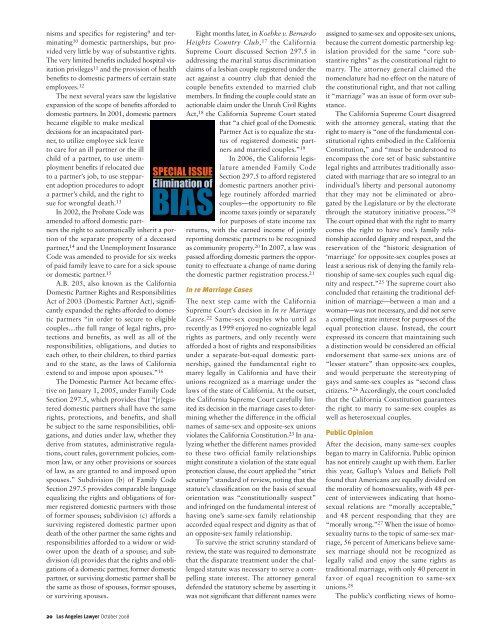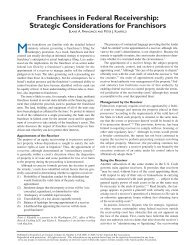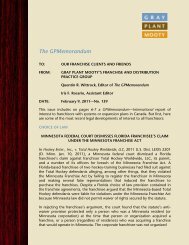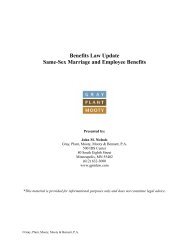Los Angeles Lawyer October 2008 - Gray Plant Mooty
Los Angeles Lawyer October 2008 - Gray Plant Mooty
Los Angeles Lawyer October 2008 - Gray Plant Mooty
Create successful ePaper yourself
Turn your PDF publications into a flip-book with our unique Google optimized e-Paper software.
nisms and specifics for registering 9 and terminating<br />
10 domestic partnerships, but provided<br />
very little by way of substantive rights.<br />
The very limited benefits included hospital visitation<br />
privileges 11 and the provision of health<br />
benefits to domestic partners of certain state<br />
employees. 12<br />
The next several years saw the legislative<br />
expansion of the scope of benefits afforded to<br />
domestic partners. In 2001, domestic partners<br />
became eligible to make medical<br />
decisions for an incapacitated partner,<br />
to utilize employee sick leave<br />
to care for an ill partner or the ill<br />
child of a partner, to use unemployment<br />
benefits if relocated due<br />
to a partner’s job, to use stepparent<br />
adoption procedures to adopt<br />
a partner’s child, and the right to<br />
sue for wrongful death. 13<br />
In 2002, the Probate Code was<br />
amended to afford domestic partners<br />
the right to automatically inherit a portion<br />
of the separate property of a deceased<br />
partner, 14 and the Unemployment Insurance<br />
Code was amended to provide for six weeks<br />
of paid family leave to care for a sick spouse<br />
or domestic partner. 15<br />
A.B. 205, also known as the California<br />
Domestic Partner Rights and Responsibilities<br />
Act of 2003 (Domestic Partner Act), significantly<br />
expanded the rights afforded to domestic<br />
partners “in order to secure to eligible<br />
couples…the full range of legal rights, protections<br />
and benefits, as well as all of the<br />
responsibilities, obligations, and duties to<br />
each other, to their children, to third parties<br />
and to the state, as the laws of California<br />
extend to and impose upon spouses.” 16<br />
The Domestic Partner Act became effective<br />
on January 1, 2005, under Family Code<br />
Section 297.5, which provides that “[r]egistered<br />
domestic partners shall have the same<br />
rights, protections, and benefits, and shall<br />
be subject to the same responsibilities, obligations,<br />
and duties under law, whether they<br />
derive from statutes, administrative regulations,<br />
court rules, government policies, common<br />
law, or any other provisions or sources<br />
of law, as are granted to and imposed upon<br />
spouses.” Subdivision (b) of Family Code<br />
Section 297.5 provides comparable language<br />
equalizing the rights and obligations of former<br />
registered domestic partners with those<br />
of former spouses; subdivision (c) affords a<br />
surviving registered domestic partner upon<br />
death of the other partner the same rights and<br />
responsibilities afforded to a widow or widower<br />
upon the death of a spouse; and subdivision<br />
(d) provides that the rights and obligations<br />
of a domestic partner, former domestic<br />
partner, or surviving domestic partner shall be<br />
the same as those of spouses, former spouses,<br />
or surviving spouses.<br />
Elimination of<br />
Eight months later, in Koebke v. Bernardo<br />
Heights Country Club, 17 the California<br />
Supreme Court discussed Section 297.5 in<br />
addressing the marital status discrimination<br />
claims of a lesbian couple registered under the<br />
act against a country club that denied the<br />
couple benefits extended to married club<br />
members. In finding the couple could state an<br />
actionable claim under the Unruh Civil Rights<br />
Act, 18 the California Supreme Court stated<br />
that “a chief goal of the Domestic<br />
Partner Act is to equalize the status<br />
of registered domestic partners<br />
and married couples.” 19<br />
In 2006, the California legislature<br />
amended Family Code<br />
Section 297.5 to afford registered<br />
domestic partners another privilege<br />
routinely afforded married<br />
couples—the opportunity to file<br />
income taxes jointly or separately<br />
for purposes of state income tax<br />
returns, with the earned income of jointly<br />
reporting domestic partners to be recognized<br />
as community property. 20 In 2007, a law was<br />
passed affording domestic partners the opportunity<br />
to effectuate a change of name during<br />
the domestic partner registration process. 21<br />
In re Marriage Cases<br />
The next step came with the California<br />
Supreme Court’s decision in In re Marriage<br />
Cases. 22 Same-sex couples who until as<br />
recently as 1999 enjoyed no cognizable legal<br />
rights as partners, and only recently were<br />
afforded a host of rights and responsibilities<br />
under a separate-but-equal domestic partnership,<br />
gained the fundamental right to<br />
marry legally in California and have their<br />
unions recognized as a marriage under the<br />
laws of the state of California. At the outset,<br />
the California Supreme Court carefully limited<br />
its decision in the marriage cases to determining<br />
whether the difference in the official<br />
names of same-sex and opposite-sex unions<br />
violates the California Constitution. 23 In analyzing<br />
whether the different names provided<br />
to these two official family relationships<br />
might constitute a violation of the state equal<br />
protection clause, the court applied the “strict<br />
scrutiny” standard of review, noting that the<br />
statute’s classification on the basis of sexual<br />
orientation was “constitutionally suspect”<br />
and infringed on the fundamental interest of<br />
having one’s same-sex family relationship<br />
accorded equal respect and dignity as that of<br />
an opposite-sex family relationship.<br />
To survive the strict scrutiny standard of<br />
review, the state was required to demonstrate<br />
that the disparate treatment under the challenged<br />
statute was necessary to serve a compelling<br />
state interest. The attorney general<br />
defended the statutory scheme by asserting it<br />
was not significant that different names were<br />
assigned to same-sex and opposite-sex unions,<br />
because the current domestic partnership legislation<br />
provided for the same “core substantive<br />
rights” as the constitutional right to<br />
marry. The attorney general claimed the<br />
nomenclature had no effect on the nature of<br />
the constitutional right, and that not calling<br />
it “marriage” was an issue of form over substance.<br />
The California Supreme Court disagreed<br />
with the attorney general, stating that the<br />
right to marry is “one of the fundamental constitutional<br />
rights embodied in the California<br />
Constitution,” and “must be understood to<br />
encompass the core set of basic substantive<br />
legal rights and attributes traditionally associated<br />
with marriage that are so integral to an<br />
individual’s liberty and personal autonomy<br />
that they may not be eliminated or abrogated<br />
by the Legislature or by the electorate<br />
through the statutory initiative process.” 24<br />
The court opined that with the right to marry<br />
comes the right to have one’s family relationship<br />
accorded dignity and respect, and the<br />
reservation of the “historic designation of<br />
‘marriage’ for opposite-sex couples poses at<br />
least a serious risk of denying the family relationship<br />
of same-sex couples such equal dignity<br />
and respect.” 25 The supreme court also<br />
concluded that retaining the traditional definition<br />
of marriage—between a man and a<br />
woman—was not necessary, and did not serve<br />
a compelling state interest for purposes of the<br />
equal protection clause. Instead, the court<br />
expressed its concern that maintaining such<br />
a distinction would be considered an official<br />
endorsement that same-sex unions are of<br />
“lesser stature” than opposite-sex couples,<br />
and would perpetuate the stereotyping of<br />
gays and same-sex couples as “second class<br />
citizens.” 26 Accordingly, the court concluded<br />
that the California Constitution guarantees<br />
the right to marry to same-sex couples as<br />
well as heterosexual couples.<br />
Public Opinion<br />
After the decision, many same-sex couples<br />
began to marry in California. Public opinion<br />
has not entirely caught up with them. Earlier<br />
this year, Gallup’s Values and Beliefs Poll<br />
found that Americans are equally divided on<br />
the morality of homosexuality, with 48 percent<br />
of interviewees indicating that homosexual<br />
relations are “morally acceptable,”<br />
and 48 percent responding that they are<br />
“morally wrong.” 27 When the issue of homosexuality<br />
turns to the topic of same-sex marriage,<br />
56 percent of Americans believe samesex<br />
marriage should not be recognized as<br />
legally valid and enjoy the same rights as<br />
traditional marriage, with only 40 percent in<br />
favor of equal recognition to same-sex<br />
unions. 28<br />
The public’s conflicting views of homo-<br />
20 <strong>Los</strong> <strong>Angeles</strong> <strong>Lawyer</strong> <strong>October</strong> <strong>2008</strong>







